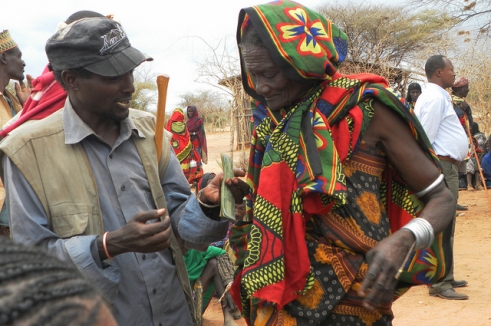By Judith Escribano
Countries such as Kenya, Ethiopia and Somalia have been affected by severe drought for many months.
So 100 days ago, in July 2011, our sister organisation Age UK and the UK-based Disasters Emergency Committee launched an appeal for the crisis. HelpAge receives money from these appeals to help older people affected.
In Ethiopia, we are providing food and cash to over 3,500 older people and their families (approximately 24,500 people) in Borana Zone and Dollo Ado.

We are also repairing wells, improving access to healthcare and exploring the possibility of running family reunification programmes in camps for displaced people.
Uncertain future
If the October-December rainy season is a good one, there is potential for an improvement in conditions. However, the weather phenomenon La Niña may have an adverse impact on the rains. If that is the case, then the next harvest is likely to fail.
Furthermore, with dengue fever on the increase and soaring food and fuel prices, conditions may not improve for some time. Already the price of wheat – an important staple food in Ethiopia – is 85 per cent higher than last year.
Many people will still need ongoing emergency support in the short term. Good rains and longer term aid will be needed in the coming years to enable people to rebuild their livelihoods.
Distributing food and mending wells
The Borana Zone is one of the worst affected regions in Ethiopia. Seventy-year-old Seke said: “I owned ten cattle, but after the drought hit, I lost nine…They were once my wealth, [they were] fat and healthy. Life was good. Now they are no more than carpets in my home. I would have sold the cattle skins to buy food but no one would buy them.”
Over the next six months, we will:
- distribute food packages and cash to 600 older people each month
- rehabilitate ten water ponds and three traditional wells using food/cash for work programmes targeting 2,000 older people
- run livelihoods training programmes for 600 older people
Seke receives a monthly cash transfer.
“I use this money to buy food, mainly maize for me and my family. This is the only means to survival I have at the moment,” she said.
Working with the displaced
We are also working in camps for displaced people in Dollo Ado, just two kilometres from the Somali border.
There are more than 100,000 refugees in these camps, but only a small proportion are older people (0.85% compared to an average of 4.3% of older people in Somalia). The low number of older people in the refugee camps implies that many older people have been left behind in Somalia.
However, while the conflict in the neighbouring country continues, we will continue to focus our efforts in the camps.
Over the next six months, we are:
- improving access to healthcare for 900 people, providing medicine, walking sticks, wheelchairs, eyecare and hearing aids
- providing food packages to 900 people
- improving temporary shelters for 900 people
How you can help
Our work is supported by our sister organisation Age UK.
You can help us too by donating to Age UK’s East Africa appeal for vulnerable older people and their families affected by the drought. Thank you very much.
Further information
- Read more on our emergencies blog.
- Age UK is raising money together with the Disasters Emergency Committee (DEC) for the East Africa Crisis. The DEC is a consortium of 14 aid agencies working together.
